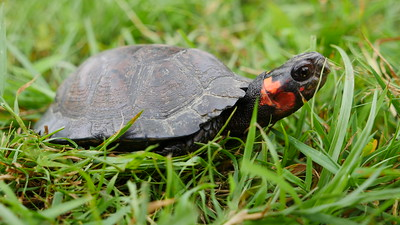Field Guide to Maryland's Turtles (Order Testudines)
Main_Content
Bog Turtle (Glyptemys muhlenbergii) | | Common Name:
|

Photo of Bog Turtle courtesy of Stephen Badger
|
Size: 3 ½ – 4 inches. Record – 4 ½ inches |
Appearance:
This is North America's smallest turtle. Characterized by a yellow, orange
or red "ear" patch, a large spot of color on either side of the head.
Rarely, this patch is white and it may be divided into two parts. The
carapace (top shell) is usually keeled; growth "rings" or annuli give it a
rough appearance. Older individuals may have a smooth shell. The shell is
longer than it is wide. The main color is black to dark olive-brown. The
large scutes, or scales, of the adult shell may have radiating pattern of
red or yellow starbursts in the center. The plastron (bottom shell) in
adults is black with cream colored blotches. The plastron of the young bog
turtle is yellow with a large black blotch in the center.

Photo of Bog Turtle
courtesy of Scott A. Smith
|
Habitats:
As its name implies, this turtle prefers spring-fed wetlands with soft
highly organic soils. They like relatively open habitats with slow flowing
stream systems or surface seepages. They are burrowers and need a soft
substrate for digging. Dominant vegetation is usually grasses and sedges.

Photo of Habitat for
Bog Turtle
courtesy of Rebecca Chalmers
|
How to Find: |
Distribution in Maryland:
Found in small portions of Maryland north-central counties, from Cecil to
Carroll. This species is Federally Threatened due to threats by collectors
and habitat loss. If you see one, please report sightings to Maryland Wildlife and
Heritage Service.

|
|
